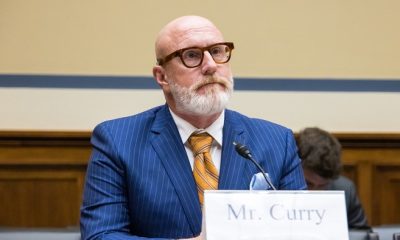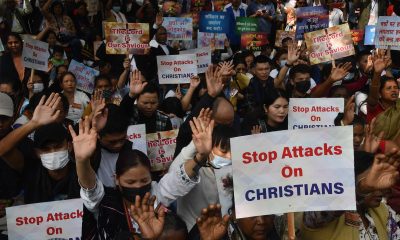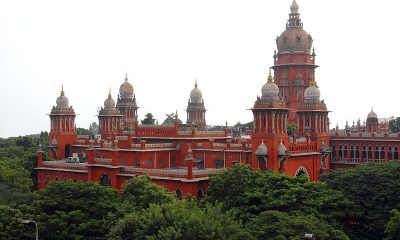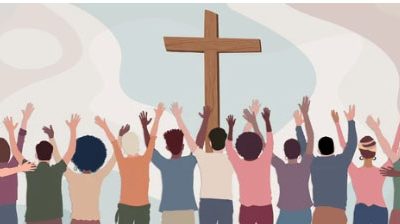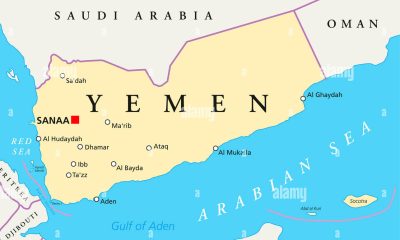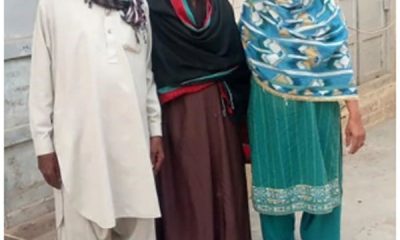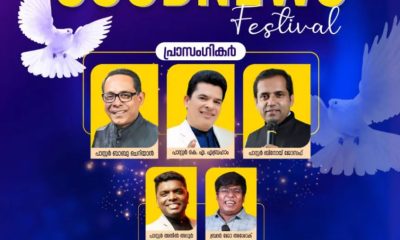us news
Christian organizations in the United States declare solidarity with Christians in India
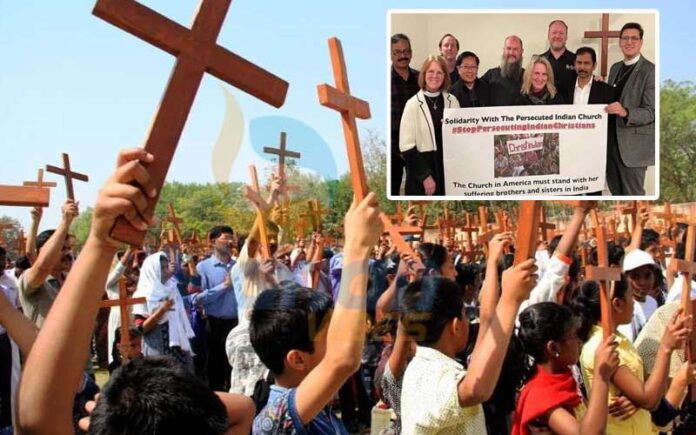
“The great moral evil that will be remembered in the year 2022 is the persecution of the millions of Christians in India,” declared Fr. Steve Macias, a priest in the Reformed Episcopal Church, as he joined fellow clergy-members to raise awareness about the escalating persecution of Indian Christians. “The religious persecution that many Christians refuse to look at, refuse to pay attention to, refuse to stand up for, refuse to be advocates for.”
Six clergy and one lay-leader representing seven different churches and ministries from five separate traditions — Anglican, Baptist, Evangelical, Lutheran, and Pentecostal — attended the 24 February event hosted by Bethel Lutheran in Roseville, CA. Pastor Eric Eurén of Riverside Christian Church noted that, when he raises the issue of Indian Christian persecution with colleagues, “many of them are shocked to hear that there is Christian persecution going on in India.” Yet, referencing India’s ruling Hindu nationalist Bharatiya Janata Party, Pastor Paul Sunkari of Indian Christian Church of Sacramento explained, “The persecution has increased four-fold since the time when BJP has taken over the country, and it’s going to increase more, and it’s continuing.”
Father Joshua Lickter of the Anglican Church in North America recalled how his congregation helped organize a vigil for Pastor Sultan Masih after he was assassinated outside his Punjab, India church in 2017.
“There’s a hurricane-level right now cultural storm that’s brewing in India, and it’s one that could potentially decimate the Indian Christian population,” said Lickter. “Things were bad when Pastor Masih was killed. I mean, the situation wasn’t exactly ideal in India at that time. But since then, things have gotten so much worse…. Extreme religious leaders in India right now are advocating, they’re telling their people to go out and harm Christians, burn churches, degrade their religious icons, do all kinds of horrible, atrocious things.”
Eurén described how, because his father owned a jewelry company that did extensive business in India, it gave him a chance from a young age to become familiar with the country and its people. “I know that the India of the 1980s, 1990s is very different from the India of today,” he said. “My experience is, from the people suffering persecution, their number one request is for prayer. That is often followed by the comment: ‘Why are none of our brothers and sisters in Christ in America talking about what’s going on in India?’”
The general lack of awareness was highlighted in opening remarks by Pieter Friedrich, a freelance journalist who set the stage by describing how the rise of Hindu nationalism has impacted Indian Christians. “Persecution of Indian Christians is skyrocketing, but we here in America generally remain not only unaware of the severity of the situation, but are all too often — especially as American Christians — totally ignorant of the reality that there is even any persecution occurring at all,” said Friedrich. Describing how the persecution is perpetrated by the Rashtriya Swayamsevak Sangh (RSS) or its affiliates, he noted that the BJP is the political wing of the RSS. The RSS, he said, is a paramilitary with historical links to the fascist movements of Europe. The organization believes that only Hindus have a birthright to Indian citizenship and views Christians as well as Muslims as “traitors” because they choose not to be Hindus.
“This is the ideology of the paramilitary whose political wing, the BJP, has been in complete control of India since 2014,” warned Friedrich. “Every year since 2014, the total number of violent incidents reported against Indian Christians has increased, reaching an all-time high in 2021 of 505 attacks.” Adding that most of these were mob attacks, he pointed to how Open Doors USA, a nonprofit monitoring persecution of Christians around the world, has ranked India as the 10th most dangerous country in which to be a Christian every year since 2019.
“Notably, while there are nine other countries where persecution of Christians does rank higher, India has three distinguishing factors from them all,” explained Friedrich. “First, it is the only legitimate, officially secular democracy on the list; second, as the second-most populated country in the world, its population is more than twice that of all the other nine combined; third, it is the only country which is an ally of the United States.”
“There is a difference between a Christian in the United States and a Christian in India,” said Macias. “We have the use of our freedom to advocate for those who have no voice. We have the use of our freedom to speak for those who are silenced by violence, by economic oppression, by political movements that would like to see them either not worship or not live in their nation.”
He continued: “The reason why I am here today is because what we are recognizing is a great evil: the persecution of religious minorities, specifically the Christians who are being attacked, and mobbed, beaten, and robbed because of their religious affiliation. We have a responsibility to contend against such evil…. Not only are we to see it, recognize it, hear it, but we are to make no peace with oppression. Make no peace. As a Christian, I pray this wholeheartedly: make no peace with oppression, make no peace with those who hold the idea that Hindu is the faith of all people, make no peace with those who say that their political nationalism must be oppressive towards all people, make no peace with the oppression that says we cannot fully express who we are.”
“We never felt threatened because of the religion,” said Sunkari about growing up in India. “We never felt constrained to express who we are as Christians.” Lamenting that “those good old days have gone,” he explained, “Looking at the past eight years or so, whenever I hear the news about persecution, I feel sad, I feel agitated, I feel I need to do something about it. But it is primarily not because I’m an Indian, because I was born and raised in India. That is one of the reasons. But primarily, they are my brothers and sisters in Christ.”
“We are all connected with Christ as head,” concluded Sunkari. “We are one body. If my pinky gets hurt, my whole body notices it. Suffers. So if one person somewhere in India gets hurt, we should feel it, because we are all connected as one body in Christ. It is my humble request and appeal to all of you to educate people about what is going on and expose these militant organizations.” Calling for international attention to the issue, he added, “We need to have advocacy. We need to raise our voice, and we need to bring it up. This is where the American Church comes into play.”
The theme uniting the speeches by all clergy was a consensus both that the American Church knows very little about the persecution of their brothers and sisters in India as well as that there’s a duty for them to begin learning about, praying for, and speaking about it.
Pastor Wally Magdangal of Christians in Crisis delivered a powerful testimony about how, after 11 years leading the largest underground church in Saudi Arabia, he was arrested and sentenced to death in 1992 only to be miraculously given a reprieve at the last minute. “I’m alive today, I live in the most prosperous, most freedom-loving people on the planet Earth, all because of prayers,” declared Magdangal. “During my incarceration, I was sentenced to die, I was on death row, I was tortured every day, but at the closing of my days approaching to the day of execution, there was a global prayer network. It started in Arabia. Saudi Arabia’s secret followers of Christ were our number one prayer partners. They were praying for my freedom. For my release from the death sentence.”
Yet Magdangal had strong words for the Church in America. “I traveled all over the fifty states,” he said. “My message was only one: Jesus Christ and the persecuted Church. I tell you this, less than one percent were interested. Mind you, I drew big crowds — anywhere from 1,000 to 100,000 in America — and yet nobody came back to us to support the persecuted Church.” Noting that God works through prayers, he concluded, “The increase of persecution is simply the fact and the reality that not many care and pray for Christians in crisis situations. That’s the simple truth.”
“Prayer is the fundamental, the first thing that we should do when it comes to this news of persecution,” said Sunkari. He was echoed by Lickter, who stated, “We need to pray faithfully for the persecuted Church in India. And more than that, we need to educate our colleagues and our parishioners…. We need to get the word out so that people realize what’s happening in India right now.”
“The members of the body in India that are facing persecution are equally as important as any other member of the body of Christ in America, and when one member of the body is suffering, all the members of the body are affected,” exhorted Eurén. “We need to have the same compassion, love, tenderness, zeal for each other that we have for other members in our own families, our blood relatives. That is the level that we should be praying for, and speaking up, and letting other people know about the persecution that’s going on in India. So that is my calling and request of you: to actively engage in prayer.”
Carmon Conover, a local marriage and family therapist, emceed the event. “I can’t image the trauma lived by those faithful Christians who have experienced this persecution or witnessed it happening to their brothers and sisters in Christ,” she said. “I am trained to use many interventions to relieve the suffering of my clients. The most powerful intervention, however, and this is confirmed by many studies of the efficacy of therapeutic interventions, is being a witness to their story and sitting with them as they tell it. The power of being seen is one of the most effective things we can offer to those who suffer.”
Speaking directly to the Church in India, Lickter stated, “If there are any Indian Christians who hear me right now, I want you to know that you’re not suffering alone. We hear you, we’re praying for you, and we’re standing in solidarity with you.”
“It’s been wonderful to hear the various perspectives on what’s happening in India tonight,” he added. “It’s been educational. It’s also been a little bit emotional. And I’m just thrilled that there are people willing to gather and to speak up about this. Our numbers might seem small tonight, but, you know, Jesus started with 12, right, and the entire world was ultimately impacted by those 12 people. So don’t lament our smallness in numbers. Let’s take action together, let’s be faithful in prayer, and let’s lean upon the Lord and trust that He will take care of the situation and multiply awareness. And we can be agents that He will use to bring about change.”
“Persecuted Christians matter to God,” said Magdangal. “If they matter to Him, they should matter to us.” He concluded, “I pray to God that this will grow in momentum. What you started tonight, I pray to God that this will be used by the Lord to recruit more Christians to pray for our brothers and sisters from India. We’re talking about one nation, but there are many throughout the world.”
Pastor Carolyn Brodt of Bethel Lutheran, who provided the venue, noted how happy she was at the opportunity to host a “clergy event for solidarity with the persecuted Church in India.” Brother Sam Benet of New Testament Church closed the event in prayer, specifically praying for the “extremists,” the RSS, and the BJP, an echo of Lickter’s opening prayer, in which he asked that God would not only “encourage the persecuted Church” in India” but also “change the hearts of those leading the persecution.”
http://theendtimeradio.com
us news
16 വയസിന് താഴെയുള്ള കുട്ടികളിൽ സോഷ്യൽ മീഡിയ നിരോധിക്കാൻ യുകെ

ലണ്ടന്: ഓസ്ട്രേലിയക്ക് പിന്നാലെ 16 വയസിന് താഴെയുള്ള കുട്ടികളില് സോഷ്യല് മീഡിയ നിരോധനം കൊണ്ടുവരാന് യുകെയും. ഓണ്ലൈന് സുരക്ഷ ഉറപ്പാക്കാന് തനിക്കാവുന്നത് ചെയ്യുമെന്ന് യുകെ സാങ്കേതിക വിദ്യ സെക്രട്ടറി പീറ്റര് കൈലേയെ ഉദ്ധരിച്ച് ബിബിസി റിപ്പോര്ട്ട് ചെയ്യുന്നു. എല്ലാത്തിന്റെയും രേഖകള് കയ്യിലുണ്ടെന്നും തനിക്ക് ആദ്യം കൂടുതല് തെളിവുകള് ലഭിക്കണമെന്നും അദ്ദേഹം വ്യക്തമാക്കി. യുവാക്കളിലെ സോഷ്യല് മീഡിയകളുടെയും സ്മാര്ട്ട്ഫോണുകളുടെയും സ്വാധീനത്തെക്കുറിച്ച് കൂടുതല് ഗവേഷണം നടത്തുമെന്നും കൈലേ പറഞ്ഞു.
16 വയസുവരെയുള്ള കുട്ടികളില് സോഷ്യല് മീഡിയ ഉപയോഗിക്കുന്നത് നിരോധിക്കുന്നതിനുള്ള നിയമം ലോകത്തിലാദ്യമായി ഓസ്ട്രേലിയ അവതരിപ്പിച്ചിരുന്നു. ഓസ്ട്രേലിയയിലെ കമ്മ്യൂണിക്കേഷന് മന്ത്രി മിഷേല് റോളണ്ട് അവതരിപ്പിച്ച ബില്ല് ഓണ്ലൈന് സുരക്ഷയുമായി ബന്ധപ്പെട്ടുള്ള രക്ഷിതാക്കളുടെ ആശങ്കയ്ക്ക് പ്രാധാന്യം നല്കുന്നു. ബില്ല് പാസായാല് നിയന്ത്രണമേര്പ്പെടുത്താന് ഒരു വര്ഷം വരെയെങ്കിലും സമയമെടുക്കും.
കുട്ടികള് അക്കൗണ്ട് എടുക്കുന്നത് തടഞ്ഞില്ലെങ്കില് സാമൂഹ്യ മാധ്യമങ്ങള് നഷ്ടപരിഹാരം നല്കേണ്ടി വരുമെന്നും ബില്ലില് പറയുന്നുണ്ട്. ഇങ്ങനെ സംഭവിച്ചാല് ടിക് ടോക്, ഫേസ്ബുക്ക്, സ്നാപ്ചാറ്റ്, റെഡ്ഡിറ്റ്, എക്സ്, ഇന്സ്റ്റാഗ്രാം തുടങ്ങിയ പ്ലാറ്റ്ഫോമുകള് 3.3 കോടി ഡോളര് പിഴ നല്കേണ്ടി വരും. സോഷ്യമീഡിയ പ്ലാറ്റ്ഫോമുകളില് സംരക്ഷണം ഒരുക്കേണ്ട ചുമതല കുട്ടികള്ക്കോ മാതാപിതാക്കള്ക്കോ അല്ലെന്നും മൈക്കിള് റോളണ്ട് പറഞ്ഞു. 18 വയസിന് താഴെയുള്ളവർക്ക് ഓണ്ലൈന് പോണോഗ്രഫി നിരോധിക്കാനുള്ള നിയമവും ഓസ്ട്രേലിയ ആലോചിക്കുന്നുണ്ട്.
Sources:azchavattomonline.com
us news
British Evangelist Slashed, Imprisoned, Threatened with Death, Keeps Going
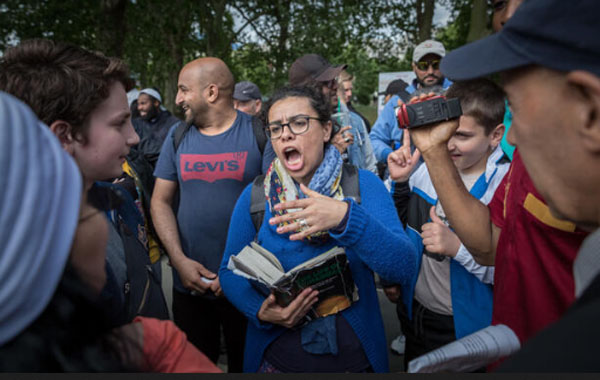
LONDON – An ex-Muslim turned Christian evangelist has been beaten, chased by angry mobs, unlawfully jailed and even stabbed, all for the sake of the Gospel.
This is not in Afghanistan or Saudi Arabia. It is officially happening in Christian Britain.
Her name is Hatun Tash, and what has been done to her has even caught the attention of the British media.
Tash grew up in Turkey as a Muslim and became a Christian after moving to England. And being an ex-Muslim speaking out against Islam has made her a target.
She told us she has changed residences more than 50 times in the past four years because she knows Muslims are looking for her in order to kill her. One man has already been sentenced to 24 years in prison for trying.
Because of this ongoing danger, she asked that we interview her from a secret location.
Tash told us her conversion to Christ began when she learned the truth about Islam and Mohammed.
“As I read biography, it was very disturbing to me. So, the man you grew up to love and honor suddenly turns out to be like, yeah, not good, not good. And I decided, I can’t be Muslim.”
Then she learned about a very different God than the one of Islam, telling us, “As you dig into it, you get to meet with a God who is not silent or far or distant from you, but you meet with a God who loves you, who pours out himself on you. And not only that, He just puts himself on the cross and then says, ‘I love you from everlasting to everlasting, Come to me.'”
Tash began sharing this message to Muslims at Speakers Corner, in London’s Hyde Park, where speakers climb atop stepladders and vigorous debates ensue, often between Muslims and Christians.
Her preaching and criticism of Islam has sometimes enraged Muslims, and three years ago a man slashed her face with a knife. He has never been caught.
She however has been arrested unlawfully more than once. The London Police have twice paid her damages for wrongful arrests, including two years ago when she refused to leave the area where she was preaching. Tash was forcibly marched through Hyde Park, followed by Muslims celebrating her arrest. She was placed in a police van, strip-searched, and jailed.
This has not stopped Tash from going to mosques and sharing the Gospel daily.
“I would simply stand in front of the mosques, and I’d say ‘Muhammad is a false prophet. Jesus Christ is the Son of God. Tell me, what is your objections?’ Hundreds of Muslims just stop and then they want to talk to you. Sometimes you get harmed, sometimes it gets dangerous. Sometimes you end up in hospitals, sometimes you end up in people’s homes for a cup of tea,” Tash said.
“I don’t care whether people reject me or not. They need to hear the gospel,” she said.
Christian Concern’s Christian Legal Centre has defended Tash. Christian Concern’s Andrea Williams told us, “The truth is that those that have attempted to kill her have been caught on camera. The police know who they are, but they have not been arrested. She is feared by and targeted by Muslim groups because she is fearless for the gospel. She loves Jesus so much that nothing will halt her.”
Tash says she will continue to preach and continue to challenge Islam.
“Things are dangerous. Should I choose to stay silent? Like when people are spending 5,000 Pounds to buy a gun, to shoot you and shoot your loved ones? The Gospel is so glorious, I cannot be silent. And the Lord is the giver of life. So, when it’s my time, He will take me home. But until He gives me breath, we continue to preach.”
Sources:CBN News
us news
‘Christ Laid His Life Down for Me’: Greg Laurie Gives Powerful Gospel Presentation to Jordan Peterson
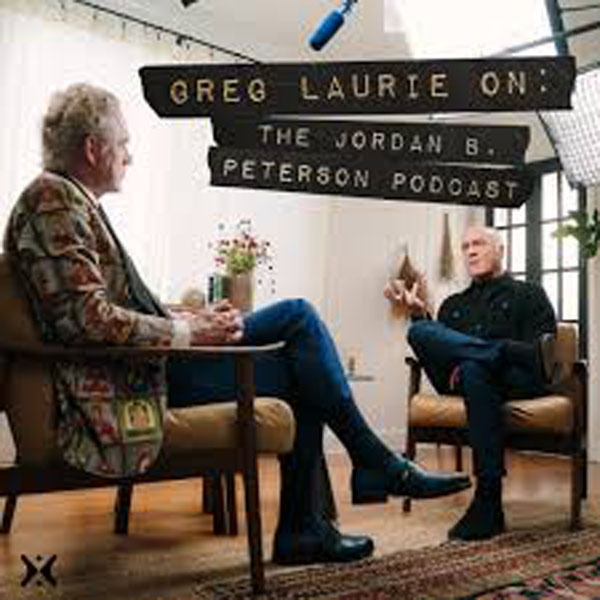
Christian megachurch leader Greg Laurie recently appeared on psychologist Jordan Peterson’s podcast, where he gave the professor-turned-cultural commentator a powerful presentation of the Gospel.
“When everything’s said and done, what’s more important than the afterlife?” the California-based pastor asked Peterson. “What’s more important than where we spend it? According to the Bible, I believe there’s a literal heaven, a literal hell, and I believe we choose in this life where we will spend the afterlife.”
Laurie added he’s going to spend eternity in heaven “not because I’ve lived a good life — because I failed in many ways — but because Christ laid His life down for me on the cross.”
“Coming back to Abraham, and what a picture, the son was willing to go and be sacrificed by the father,” the pastor continued, referring to the Old Testament story of Genesis 22. “[Isaac] knew what was going on: ‘Hey, Dad, where’s the sacrifice?’ ‘My son, God will provide for Himself a sacrifice.’ But Isaac made that sacrifice, too. The Son Jesus made that sacrifice for us, because He knew there was no other way that we could reach God, no other way we could satisfy the righteous demands of God. So Heaven isn’t for good people, as it’s often said; heaven is for forgiven people.”
The conversation between Peterson and Laurie stemmed from the 71-year-old minister opening up about the death of his son, Christopher, who passed away in 2008 as a result of a tragic car accident.
He described that day in July of 2008 as the “worst” day in his life. Nevertheless, Laurie said he is not without hope — because of his faith in the redemptive work of Jesus.
“I believe I’ll see my son again, because he believed in Jesus,” Laurie explained. “He won’t be in heaven because I’m his dad; he’ll be in heaven because he put his faith in Christ and he had that relationship. He’s a part of my future as well, so that gives me hope. But, also, I realize that God can allow these things in our life. I don’t know why. I can’t explain it. I don’t even try to explain it.”
Peterson, author of the new book, “We Who Wrestle With God: Perceptions of the Divine,” admitted to Laurie he struggles to intellectually reconcile a desire to perfect the earthly world with the knowledge the Christian life is heavily weighted toward considering eternity.
The famed psychologist and podcast host asked, “How do you reconcile, in your own mind, the insistence that part of the Christian moral pattern is to perfect the world and to raise the material up to the heavenly with the notion of the afterlife and immortality?”
Laurie referenced 2 Corinthians 12:2-4, in which the Apostle Paul wrote about experiencing a “third heaven,” as well as the thief on the cross next to Jesus, Who promised the man, “Truly I tell you, today you will be with Me in paradise” (Luke 23:42-43, NIV).
The pastor explained he has felt closest to God — and His promises of eternity — through life’s trials.
“God made a lot of promises,” said Laurie. “I’ve put those promises to the test, including the worst thing of all, to lose a child. And I’ve seen how God had come through for me. If He hadn’t come through for me after my son died, I would have given up preaching, for sure. Why carry on? But He came through for me.”
Sources:faithwire
-

 Travel6 months ago
Travel6 months agoയാക്കൂസ കരിഷ്മ:ഓല സ്കൂട്ടറിനേക്കാൾ വിലക്കുറവിൽ കുഞ്ഞൻ കാർ; സിറ്റി യാത്രകൾക്ക് ഇനി ഇവൻ മതിയാവും
-

 Tech4 months ago
Tech4 months agoചിത്രങ്ങൾ എഡിറ്റ് ചെയ്യാം; വാട്സ്ആപ്പിലെ ‘നീല വളയം’ സ്മാർട്ടാകുന്നു, കാര്യമായ മാറ്റങ്ങൾ
-

 National9 months ago
National9 months agoനെയ്തേലിപ്പടി ക്രൂസേഡിന് അനുഗ്രഹീത സമാപ്തി
-
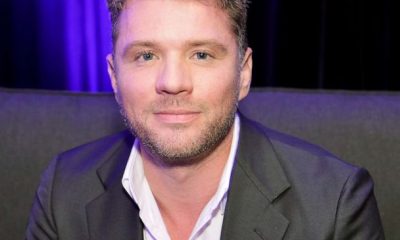
 Movie8 months ago
Movie8 months agoActor Ryan Phillippe ‘Craving’ Relationship With God After Movie About Christian Missionary
-
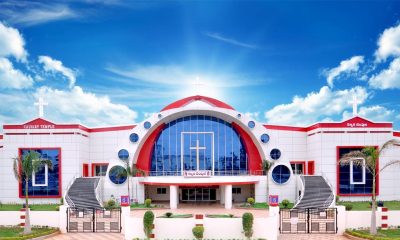
 National9 months ago
National9 months ago300,000-Member Indian Church to Plant 40 More Megachurches
-

 Movie11 months ago
Movie11 months agoBrazilian gospel singer Pedro Henrique dies of heart attack after collapsing on stage
-

 Articles5 months ago
Articles5 months ago8 ways the Kingdom connects us back to the Garden of Eden
-

 Hot News8 months ago
Hot News8 months ago3 key evidences of Jesus’ return from the grave

